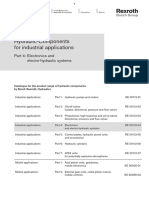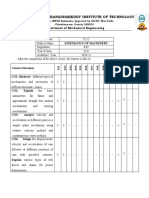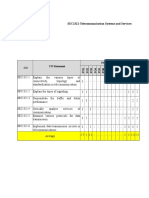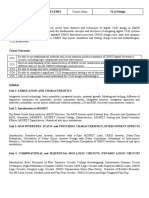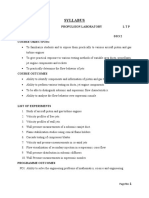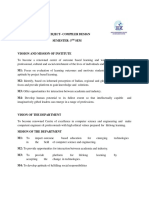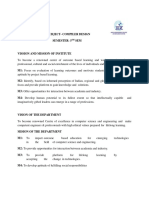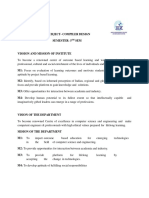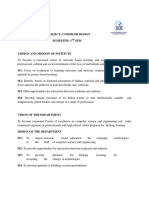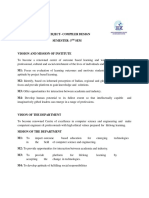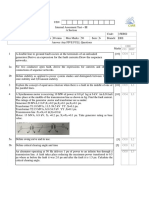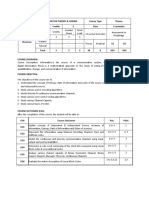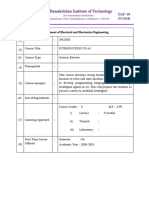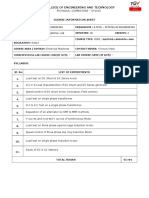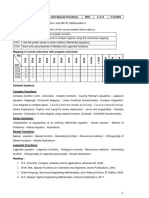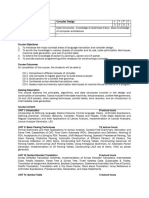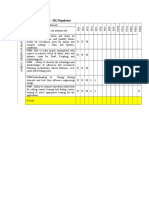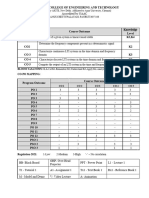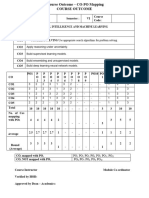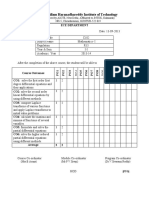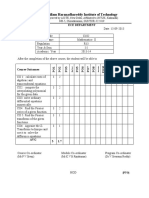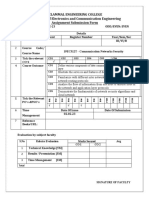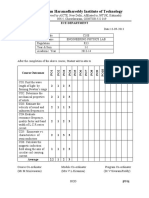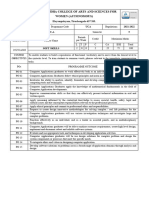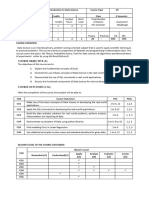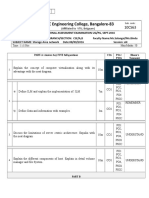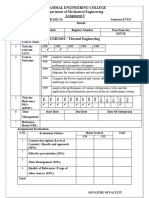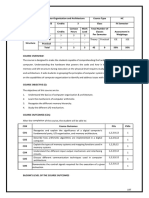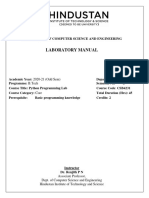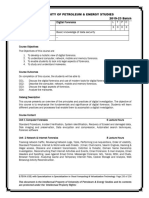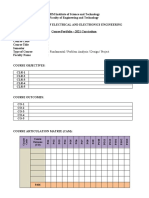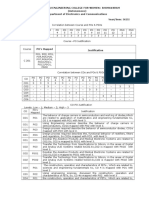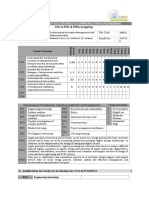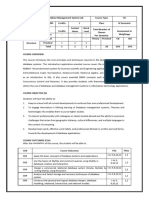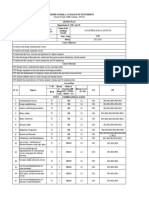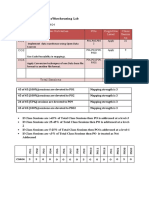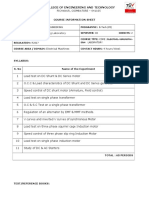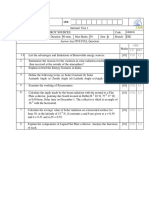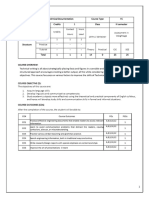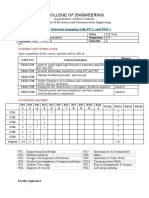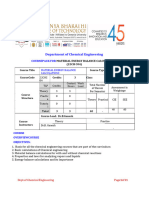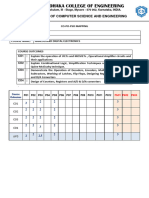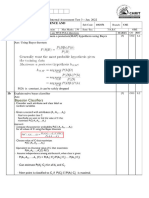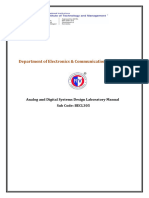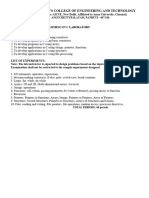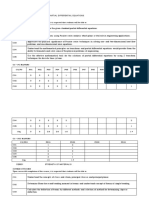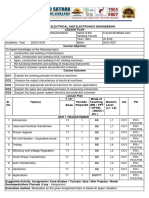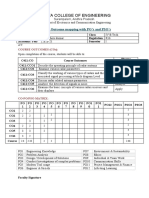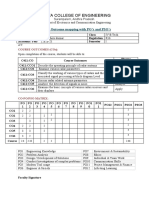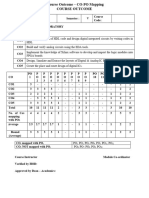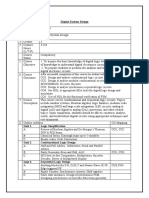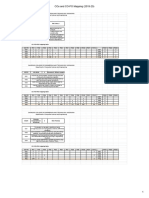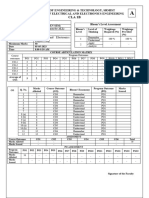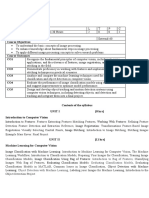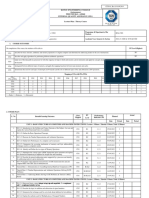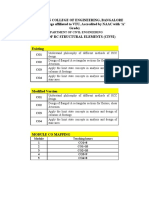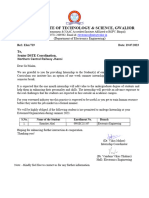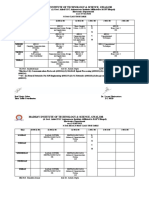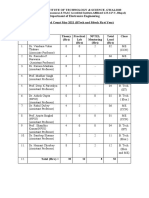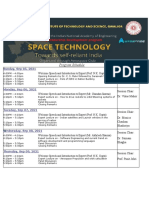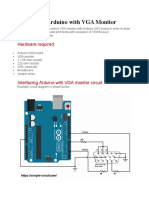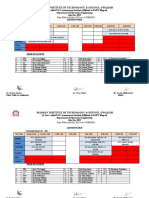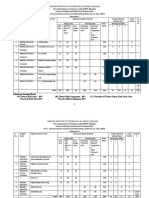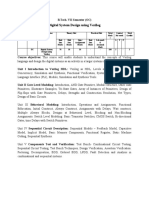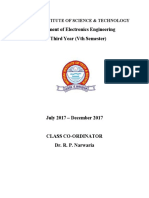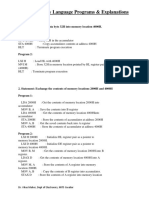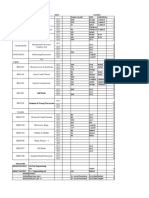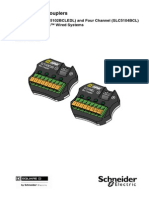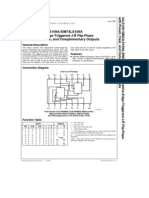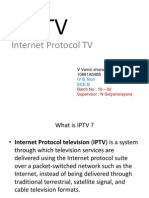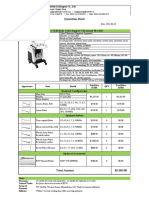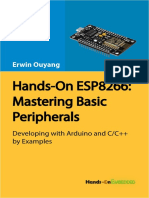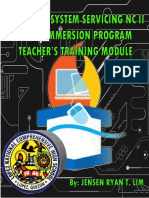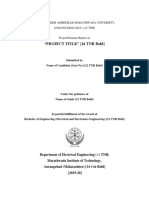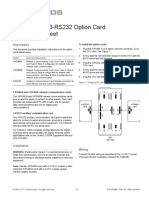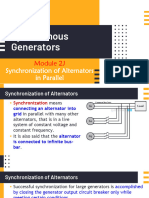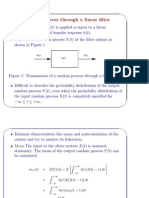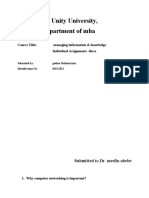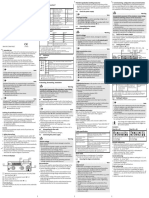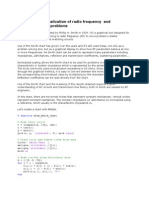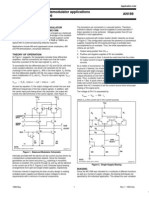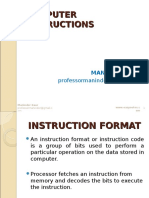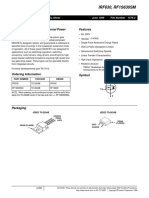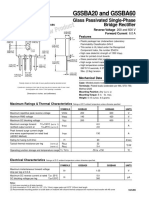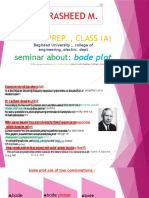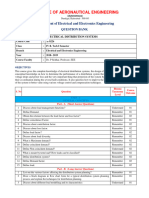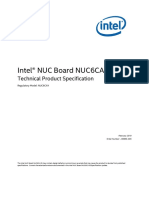Professional Documents
Culture Documents
CO-PO Matrix Digital Theory
CO-PO Matrix Digital Theory
Uploaded by
Vikas MahorOriginal Description:
Copyright
Available Formats
Share this document
Did you find this document useful?
Is this content inappropriate?
Report this DocumentCopyright:
Available Formats
CO-PO Matrix Digital Theory
CO-PO Matrix Digital Theory
Uploaded by
Vikas MahorCopyright:
Available Formats
CO-PO Mapping Matrix
Subject Code: Digital Circuits and System
Subject Name: BELL/BETL - 303
Semester/Year: IIIth/ 2nd
Name of Faculty: Dr. Vikas Mahor
Course Statement
Out-
PSO1
PSO2
PO10
PO11
PO12
PO1
PO2
PO3
PO4
PO5
PO6
PO7
PO8
PO9
come
CO1 Identify different logic gates, their 3 3 3 1 3 3 2 1 3 3 3
realizations and truth tables.
CO2 Prove properties of Boolean algebra. 3 3 3 1 3 2 1 3 1 1
CO3 Design various synchronous and 3 3 3 3 3 2 2 3 2 2 3 2 3
asynchronous sequential circuits.
CO4 Discriminate between combinational 1 3 3 3 3 2 3 1 2 2 3
and sequential circuits.
CO5 Describe the operation of different 3 3 3 3 3 3 3 2 1 3 2 2 2
types of semiconductor memories.
CO6 Compare the Logic families and 3 3 3 3 3 2 3 3 1 3 3 3 3
converters.
Signature of Faculty
Program Outcomes (PO):
1. Graduates will be able to demonstrate knowledge of Mathematics, Science and Engineering in Electronics and Communications.
2. Graduates will be able to identify, design, formulate, and solve Electronics and Communication Engineering problems and experiments, as well as Analyze & Interpret Data.
3. Graduates will get the ability to design a System, Component, or Process to meet desired needs with in realistic constraints such as Economic, Environmental, Social, Ethical, Manufacturability, and Sustainability.
4. Graduates will be able to use research based knowledge and research methods to model, analyze and interpret electronics devices and circuits & conduct experiments according to variable input data and hence
contribute towards problem solving.
5. Graduate will be able to Create, select, and apply appropriate techniques, resources, and modern engineering and IT tools like CST, Lab view & MATLAB including prediction and modeling to complex
engineering activities with an understanding of the limitations
6. Understand the impact of the professional engineering solutions in societal contexts, health, safety, legal and cultural issues and the consequent responsibilities relevant to the professional engineering practice
7. Graduates will be able to appreciate the impact of industrial activities on global warming and finding the sustainable technical solutions through independent and reflective learning.
8. Graduates will be able to acquire professional and ethical responsibilities
9. Graduates will get the ability to undertake project in emerging areas to function effectively as an individual, and as a member or leader in diverse team, and in multidisciplinary group.
10. Graduates will be able to communicate effectively in both oral and written form.
11. Graduates will be able to understand the importance of financial and manergial aspects in power system infrastructure development.
12. Graduates will be able to acquire skills and ability for independent and life -long learning
Program Specific Outcomes (PSO):
1. Graduates will be able to clearly understand the basic concepts and applications in the field of Electronics & Telecommunication Engineering and to apply them to various areas, like Electronics, Communications,
Signal processing, VLSI, Embedded systems etc., in the design and implementation of complex systems.
2. Graduates will be able to formulate, plan, administrate and execute projects in the digital and analog electronics, telecommunication and control areas.
You might also like
- RE 00112 - Part 4Document752 pagesRE 00112 - Part 4Yer PeeNo ratings yet
- Kallam Haranadhareddy Institute of Technology: Department of Mechanical EngineeringDocument2 pagesKallam Haranadhareddy Institute of Technology: Department of Mechanical EngineeringsuswagatNo ratings yet
- CAM Matlab ModifiedDocument17 pagesCAM Matlab ModifiedScindhia MohaneNo ratings yet
- VLSI Design SyllabusDocument2 pagesVLSI Design SyllabusMr. Kishore Ajay Kumar AyyalaNo ratings yet
- Syllabus: AE6512 Propulsion Laboratory LTP C 0 0 3 2 Course ObjectivesDocument43 pagesSyllabus: AE6512 Propulsion Laboratory LTP C 0 0 3 2 Course ObjectivesBasith AbbasNo ratings yet
- Unit 3Document92 pagesUnit 3meghwalarjun75No ratings yet
- Unit 4Document26 pagesUnit 4meghwalarjun75No ratings yet
- Unit 5Document37 pagesUnit 5meghwalarjun75No ratings yet
- Unit 1Document81 pagesUnit 1Dhun SharmaNo ratings yet
- Unit 2Document143 pagesUnit 2meghwalarjun75No ratings yet
- Os Newco-18Document1 pageOs Newco-18Rajeshwari R PNo ratings yet
- IAT - III Question Paper With Solution of 15EE62 Power System Analysis May 2018 - Prof. Sanitha Michail. CDocument24 pagesIAT - III Question Paper With Solution of 15EE62 Power System Analysis May 2018 - Prof. Sanitha Michail. CShaun DsouzaNo ratings yet
- Course Title Information Theory & Coding Course Type Theory Course Code Credits 3 Class V SemesterDocument3 pagesCourse Title Information Theory & Coding Course Type Theory Course Code Credits 3 Class V SemesterManjunath VarchagallNo ratings yet
- Uaf AiDocument7 pagesUaf Aiadrijovin.itNo ratings yet
- Intro To Python Programming-SyllabusDocument3 pagesIntro To Python Programming-SyllabusHanith CgNo ratings yet
- JCT College of Engineering and Technology: Course Information SheetDocument6 pagesJCT College of Engineering and Technology: Course Information SheetDhamu DharanNo ratings yet
- Btech Ece SyllabusDocument14 pagesBtech Ece SyllabusSailokesh NagaruruNo ratings yet
- Syllabus - Compiler DesignDocument2 pagesSyllabus - Compiler Design47 SARANG XII BNo ratings yet
- Co Po Mapping (Example)Document2 pagesCo Po Mapping (Example)selva_raj215414No ratings yet
- Course Outcome SsDocument1 pageCourse Outcome SsAmarkavi Balu supper childNo ratings yet
- AI Co-Po MappingDocument2 pagesAI Co-Po Mappingmangai.eceNo ratings yet
- Kallam Haranadhareddy Institute of Technology: Ece DepartmentDocument2 pagesKallam Haranadhareddy Institute of Technology: Ece DepartmentmuraliNo ratings yet
- Kallam Haranadhareddy Institute of Technology: Ece DepartmentDocument2 pagesKallam Haranadhareddy Institute of Technology: Ece DepartmentmuraliNo ratings yet
- ASSIGNMENT RUBRICS FORMAT Front PageDocument1 pageASSIGNMENT RUBRICS FORMAT Front Pagesaru priyaNo ratings yet
- Kallam Haranadhareddy Institute of Technology: Ece DepartmentDocument2 pagesKallam Haranadhareddy Institute of Technology: Ece DepartmentmuraliNo ratings yet
- Soft Skill - BCADocument3 pagesSoft Skill - BCAJeaneffil VimalrajNo ratings yet
- IDS SyllabusDocument3 pagesIDS SyllabusKhaushik KumaarNo ratings yet
- AMC Engineering College, Bangalore-83Document2 pagesAMC Engineering College, Bangalore-83Yutyu YuiyuiNo ratings yet
- THERMAL Assignment FrontpageDocument1 pageTHERMAL Assignment FrontpagedineshvaricomNo ratings yet
- Syllabus 1Document3 pagesSyllabus 1Hanith CgNo ratings yet
- D.E Course PlanDocument4 pagesD.E Course PlanMU AsadNo ratings yet
- CSB4231 Python Programming LaboratoryDocument82 pagesCSB4231 Python Programming LaboratoryRenjith P NNo ratings yet
- DF SyllabusDocument2 pagesDF SyllabusMansi SharmaNo ratings yet
- Course Portfolio - 2021 CurriculumDocument7 pagesCourse Portfolio - 2021 CurriculumSowmmiya UNo ratings yet
- c421 ProjectDocument2 pagesc421 ProjectMurali KrishnaNo ratings yet
- ECE CO-PO&PSO TARGET TEMPLATE OddDocument3 pagesECE CO-PO&PSO TARGET TEMPLATE OddMahesh S GourNo ratings yet
- Final DBMSLab ManualDocument54 pagesFinal DBMSLab ManualPrasad DhumaleNo ratings yet
- Cs3351-Lesson PlanDocument5 pagesCs3351-Lesson PlandhivyabharathyNo ratings yet
- Datawarehousing Lab: Course Outcomes Pos Cognitive Level Class Sessio NsDocument2 pagesDatawarehousing Lab: Course Outcomes Pos Cognitive Level Class Sessio NsRajesh KannaNo ratings yet
- Kallam Haranadhareddy Institute of Technology: Ece DepartmentDocument2 pagesKallam Haranadhareddy Institute of Technology: Ece DepartmentmuraliNo ratings yet
- JCT College of Engineering and Technology: Course Information SheetDocument7 pagesJCT College of Engineering and Technology: Course Information SheetDhamu DharanNo ratings yet
- IAT - I Question Paper With Solution 10EE836 Renewable Energy Sources March 2018 - Kashif AhmedDocument10 pagesIAT - I Question Paper With Solution 10EE836 Renewable Energy Sources March 2018 - Kashif Ahmedvishal pandeyNo ratings yet
- 1Document3 pages1Kiran JayaramNo ratings yet
- Aditya College of Engineering: Course Outcome Mapping With PO's and PSO'sDocument4 pagesAditya College of Engineering: Course Outcome Mapping With PO's and PSO'ssundarmeenakshiNo ratings yet
- MEBS Course Material ACY 23-24Document131 pagesMEBS Course Material ACY 23-24Sruthi ChallapalliNo ratings yet
- 17 Scheme PythonDocument41 pages17 Scheme Pythontechnovision22coNo ratings yet
- IAT-III Question Paper With Solution of 18CS71 Artificial Intelligence and Machine Learning (AI - ML) Jan-2022-Dr.P.Kavitha and Mr.G.Radha KrishnanDocument6 pagesIAT-III Question Paper With Solution of 18CS71 Artificial Intelligence and Machine Learning (AI - ML) Jan-2022-Dr.P.Kavitha and Mr.G.Radha KrishnanBrundaja D NNo ratings yet
- Updated - Analog & Digital Circuit Manual - BECL305Document98 pagesUpdated - Analog & Digital Circuit Manual - BECL305rvit22bec032.rvitmNo ratings yet
- Cs3271 Programming in C LaboratoryDocument4 pagesCs3271 Programming in C Laboratoryabinayasundaramoorthi2000No ratings yet
- Co Po MappingDocument71 pagesCo Po MappingPoun KumarNo ratings yet
- Lesson Plan 3254Document4 pagesLesson Plan 3254syed1188No ratings yet
- Aditya College of Engineering: Course Outcome Mapping With PO's and PSO'sDocument3 pagesAditya College of Engineering: Course Outcome Mapping With PO's and PSO'ssundarmeenakshiNo ratings yet
- Aditya College of Engineering: Course Outcome Mapping With PO's and PSO'sDocument3 pagesAditya College of Engineering: Course Outcome Mapping With PO's and PSO'ssundarmeenakshiNo ratings yet
- Vlsi Lab Co-Po MappingDocument2 pagesVlsi Lab Co-Po Mappingmangai.eceNo ratings yet
- Digital System Design: After Successful Completion of This Course The Student Will Be Able ToDocument2 pagesDigital System Design: After Successful Completion of This Course The Student Will Be Able ToAMRIT SAHNo ratings yet
- COs CSE S3 S8 With CO PO MappingDocument16 pagesCOs CSE S3 S8 With CO PO MappingPrasanna LathaNo ratings yet
- Cla 1B: Electrical and Electronics EngineeringDocument2 pagesCla 1B: Electrical and Electronics EngineeringpadmanabhanprathyushNo ratings yet
- Computer VisionDocument6 pagesComputer Visionmd alamNo ratings yet
- 20CDT33 - CO - Lecture Plan - SSDocument5 pages20CDT33 - CO - Lecture Plan - SSjaravlesNo ratings yet
- RCC Civ52 CoDocument3 pagesRCC Civ52 CojayanthNo ratings yet
- Shamsher NoCDocument1 pageShamsher NoCVikas MahorNo ratings yet
- Curriculum Feedback Electronic CircuitDocument9 pagesCurriculum Feedback Electronic CircuitVikas MahorNo ratings yet
- M.tech Time TableDocument2 pagesM.tech Time TableVikas MahorNo ratings yet
- LOAD DISTRIBUTION First Year Btech and MtechDocument2 pagesLOAD DISTRIBUTION First Year Btech and MtechVikas MahorNo ratings yet
- Scopus JournalsDocument1 pageScopus JournalsVikas MahorNo ratings yet
- EC ET 1st SemDocument6 pagesEC ET 1st SemVikas Mahor0% (1)
- Conference Event ScheduleDocument1 pageConference Event ScheduleVikas MahorNo ratings yet
- ET 1st Sem ListDocument2 pagesET 1st Sem ListVikas Mahor100% (1)
- Interfacing Arduino With VGA MonitorDocument4 pagesInterfacing Arduino With VGA MonitorVikas MahorNo ratings yet
- Lab Timetable Jul-Dec 2022 V1Document5 pagesLab Timetable Jul-Dec 2022 V1Vikas MahorNo ratings yet
- Madhav Institute of Technology & Science, GwaliorDocument4 pagesMadhav Institute of Technology & Science, GwaliorVikas MahorNo ratings yet
- Online Mid Sem 1-GradesDocument2 pagesOnline Mid Sem 1-GradesVikas MahorNo ratings yet
- Thursday, 30 September 2021, 2:30 PM Submitted Answers: 25 Questions: 15 Label ResponsesDocument3 pagesThursday, 30 September 2021, 2:30 PM Submitted Answers: 25 Questions: 15 Label ResponsesVikas MahorNo ratings yet
- Digital System Design Using VerilogDocument2 pagesDigital System Design Using VerilogVikas MahorNo ratings yet
- Offline LabDocument3 pagesOffline LabVikas MahorNo ratings yet
- 5th Sem ManualsDocument90 pages5th Sem ManualsVikas MahorNo ratings yet
- To The Concerned Authority Date: 23.05.2021Document20 pagesTo The Concerned Authority Date: 23.05.2021Vikas MahorNo ratings yet
- 8085 Imp ALP ProgramsDocument35 pages8085 Imp ALP ProgramsVikas MahorNo ratings yet
- IEEE iNIS-2016 Ieee Tcvlsi Travel Grant Recipients: Paper Name - Width-Dependent Characteristics of Graphene NanoribbonDocument1 pageIEEE iNIS-2016 Ieee Tcvlsi Travel Grant Recipients: Paper Name - Width-Dependent Characteristics of Graphene NanoribbonVikas MahorNo ratings yet
- Labs Odd SemDocument2 pagesLabs Odd SemVikas MahorNo ratings yet
- Madhav Institute of Technology & Science, Gwalior (M.P.)Document6 pagesMadhav Institute of Technology & Science, Gwalior (M.P.)Vikas MahorNo ratings yet
- Publication AnnexureDocument1 pagePublication AnnexureVikas MahorNo ratings yet
- Transaction Details: Account Title Vikas Mahor So Mr. P.C. MahorDocument1 pageTransaction Details: Account Title Vikas Mahor So Mr. P.C. MahorVikas MahorNo ratings yet
- The 9 Best Reasons To Choose ZultysDocument13 pagesThe 9 Best Reasons To Choose ZultysGreg EickeNo ratings yet
- PM - AC 800M ControllerWEWEWEDocument6 pagesPM - AC 800M ControllerWEWEWEPablo Jefferson MedinaNo ratings yet
- Bus CuplerDocument20 pagesBus Cuplerduyan1987No ratings yet
- 01 VESDA HLI Access Protocol VHX-0320 A4 TDS LoresDocument2 pages01 VESDA HLI Access Protocol VHX-0320 A4 TDS LoresChristian FernandezNo ratings yet
- 74109Document7 pages74109Nur Hasana FNo ratings yet
- IPTVDocument20 pagesIPTVVamsi SharanNo ratings yet
- Cdd35218-Sony CFD-G35 ws1032974923 PDFDocument54 pagesCdd35218-Sony CFD-G35 ws1032974923 PDFJohann SGNo ratings yet
- 210423.quotation For Color Doppler Ultrasound DW-CT520, OB&GYN Ultrasound DW-CF540Document2 pages210423.quotation For Color Doppler Ultrasound DW-CT520, OB&GYN Ultrasound DW-CF540yonas100% (1)
- Cython A Guide For Python ProgrammersDocument120 pagesCython A Guide For Python ProgrammersCristh Juarez100% (4)
- ESDDocument60 pagesESDGopi PremalaNo ratings yet
- NEW - G620 Technical Manual enDocument24 pagesNEW - G620 Technical Manual enbalanzas pesajeNo ratings yet
- Work Immersion ModuleDocument32 pagesWork Immersion Modulew3w100% (1)
- "Project Title" (16 TNR Bold) : Dr. Babasaheb Ambedkar Marathwada University, Aurangabad (M.S.) (12 TNR)Document9 pages"Project Title" (16 TNR Bold) : Dr. Babasaheb Ambedkar Marathwada University, Aurangabad (M.S.) (12 TNR)Akash GaikwadNo ratings yet
- 3-RS485 and 3-RS232 Option Card Installation Sheet: DescriptionDocument2 pages3-RS485 and 3-RS232 Option Card Installation Sheet: DescriptionDharneesh DNo ratings yet
- Module 2J Synchronization of Alternators in ParallelDocument25 pagesModule 2J Synchronization of Alternators in Parallelsнıkαмαяυ NaraNo ratings yet
- Random Process Through A Linear Filter: X (T) Y (T) H (T)Document6 pagesRandom Process Through A Linear Filter: X (T) Y (T) H (T)HarshaNo ratings yet
- MIK-Assignment 3 Gedion HailemariamDocument3 pagesMIK-Assignment 3 Gedion Hailemariamአረጋዊ ሐይለማርያምNo ratings yet
- TCP Walfish-Ikegami Model Strippad ADocument6 pagesTCP Walfish-Ikegami Model Strippad AWaqas AhmedNo ratings yet
- CTEU-EP 2017-02a 8067819g1Document2 pagesCTEU-EP 2017-02a 8067819g1Raphael Paulino BertiNo ratings yet
- 1.-Useful For Visualization of Radio Frequency and Transmission Line ProblemsDocument5 pages1.-Useful For Visualization of Radio Frequency and Transmission Line Problemssanjayb1976gmailcomNo ratings yet
- Applications of Balanced ModulatorDocument5 pagesApplications of Balanced ModulatorSomeshwar Gaddala100% (1)
- Types of InstructionsDocument12 pagesTypes of InstructionsSadaf RasheedNo ratings yet
- Irf 630Document7 pagesIrf 630ban4444No ratings yet
- New Product: G5SBA20 and G5SBA60Document2 pagesNew Product: G5SBA20 and G5SBA60CarlosNo ratings yet
- NCDriveDocument3 pagesNCDriveaaguilarmNo ratings yet
- Ali Rasheed M.: Second Prep., Class (A)Document8 pagesAli Rasheed M.: Second Prep., Class (A)ali,r98No ratings yet
- Eds QBDocument11 pagesEds QBSrinivasNo ratings yet
- NUC6CAYS NUC6CAYH TechProdSpecDocument68 pagesNUC6CAYS NUC6CAYH TechProdSpecMARCELLO THALINANo ratings yet
- ELS 30 September 2021 Rev 2.0Document12 pagesELS 30 September 2021 Rev 2.0covideee19No ratings yet
